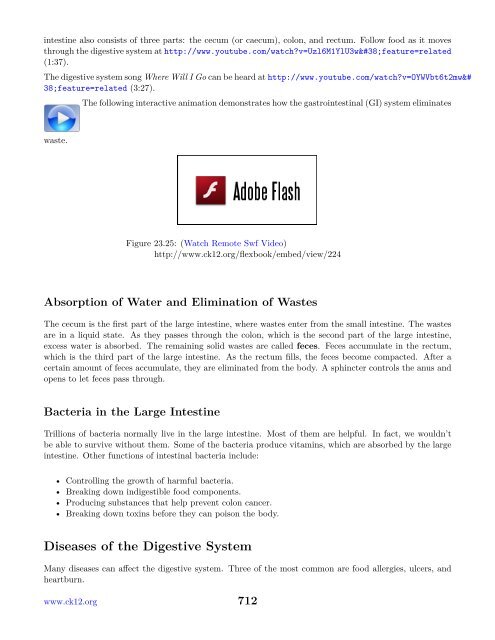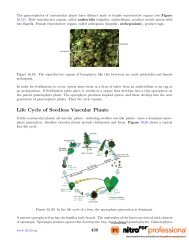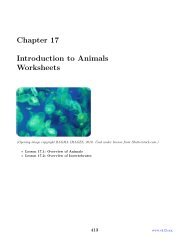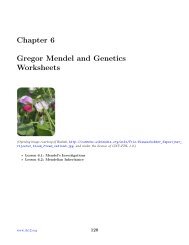Chapter 23 The Circulatory, Respiratory, Digestive, and Excretory ...
Chapter 23 The Circulatory, Respiratory, Digestive, and Excretory ...
Chapter 23 The Circulatory, Respiratory, Digestive, and Excretory ...
You also want an ePaper? Increase the reach of your titles
YUMPU automatically turns print PDFs into web optimized ePapers that Google loves.
intestine also consists of three parts: the cecum (or caecum), colon, <strong>and</strong> rectum. Follow food as it moves<br />
through the digestive system at http://www.youtube.com/watch?v=Uzl6M1YlU3w&feature=related<br />
(1:37).<br />
<strong>The</strong> digestive system song Where Will I Go can be heard at http://www.youtube.com/watch?v=OYWVbt6t2mw&#<br />
38;feature=related (3:27).<br />
waste.<br />
<strong>The</strong> following interactive animation demonstrates how the gastrointestinal (GI) system eliminates<br />
Figure <strong>23</strong>.25: (Watch Remote Swf Video)<br />
http://www.ck12.org/flexbook/embed/view/224<br />
Absorption of Water <strong>and</strong> Elimination of Wastes<br />
<strong>The</strong> cecum is the first part of the large intestine, where wastes enter from the small intestine. <strong>The</strong> wastes<br />
are in a liquid state. As they passes through the colon, which is the second part of the large intestine,<br />
excess water is absorbed. <strong>The</strong> remaining solid wastes are called feces. Feces accumulate in the rectum,<br />
which is the third part of the large intestine. As the rectum fills, the feces become compacted. After a<br />
certain amount of feces accumulate, they are eliminated from the body. A sphincter controls the anus <strong>and</strong><br />
opens to let feces pass through.<br />
Bacteria in the Large Intestine<br />
Trillions of bacteria normally live in the large intestine. Most of them are helpful. In fact, we wouldn’t<br />
be able to survive without them. Some of the bacteria produce vitamins, which are absorbed by the large<br />
intestine. Other functions of intestinal bacteria include:<br />
• Controlling the growth of harmful bacteria.<br />
• Breaking down indigestible food components.<br />
• Producing substances that help prevent colon cancer.<br />
• Breaking down toxins before they can poison the body.<br />
Diseases of the <strong>Digestive</strong> System<br />
Many diseases can affect the digestive system. Three of the most common are food allergies, ulcers, <strong>and</strong><br />
heartburn.<br />
www.ck12.org 712





